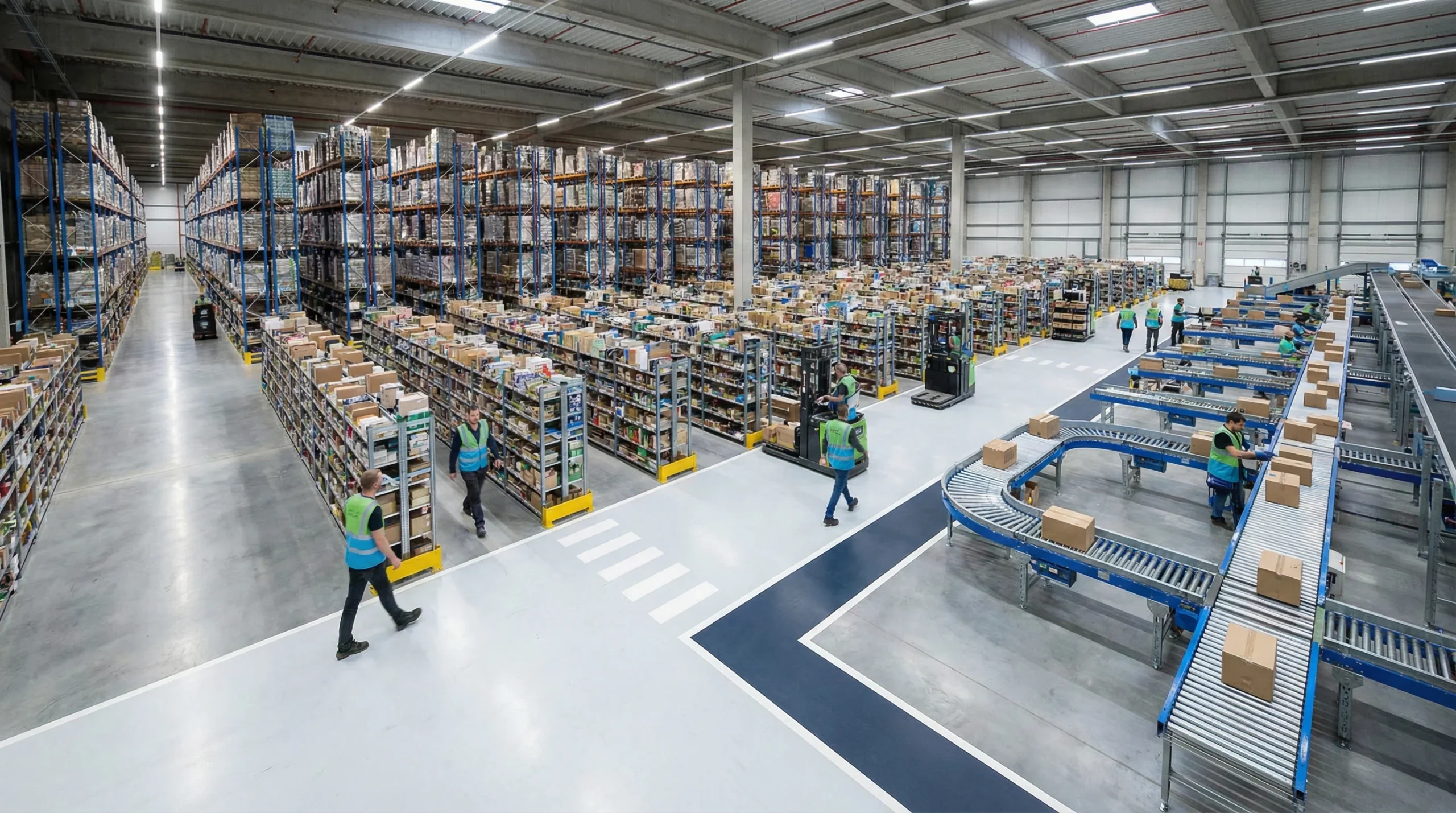Warehouse professionals in the logistics, distribution, 3PL, and related industries are under constant pressure to optimize processes, reduce costs, and ensure customer satisfaction. One solution to help achieve these goals is a cloud-based warehouse management system (cloud WMS).
This in-depth guide will provide expert-level knowledge on cloud WMS software, how they differ from traditional systems, and their benefits. We will also introduce you to SphereWMS, a leading cloud-based WMS software, to help you make an informed decision on the right system for your business.
Understanding Cloud Warehouse Management Software
A cloud WMS is a warehouse management system that is hosted on the internet, providing centralized access to data and functionality through a web-based interface. This innovative approach to warehouse management offers several advantages over traditional, on-premise systems, including scalability, flexibility, and cost efficiency.
Cloud-Based WMS vs. Traditional Warehouse Management Systems
Traditional warehouse management software systems are installed on local servers and require significant upfront investments in hardware, software licenses, and IT infrastructure. In contrast, cloud-based WMSs are accessible through a web browser and do not require any hardware or software installation. This difference results in several key benefits:
- Lower initial investment: With no need for expensive hardware, or IT infrastructure, cloud WMS solutions offer a more affordable option for businesses of all sizes.
- Easier updates and maintenance: Cloud-based systems are automatically updated and maintained by the provider, eliminating the need for manual updates and reducing the risk of system downtime.
- Scalability: Cloud warehouse management solutions can easily accommodate changes in business volume or requirements, allowing for seamless scaling up or down as needed.
- Accessibility: Users can access the system from any device with an internet connection, providing greater flexibility and convenience for warehouse staff.
Benefits of Cloud-Based Warehouse Management Systems
Cloud-based warehouse management systems offer numerous advantages over a traditional WMS, making them an attractive option for warehouse professionals in supply chain industries. Some of the key benefits of a cloud WMS include:
- Improved efficiency: A WMS in the cloud streamlines warehouse processes, automates manual tasks, and optimizes labor management, leading to increased productivity and cost savings.
- Enhanced supply chain visibility: Real-time inventory visibility and tracking, combined with integration capabilities, provide a more comprehensive view of your supply chain management, enabling better decision-making.
- Scalability: Cloud-based solutions can easily scale to accommodate your business’s growth, allowing you to add users, warehouses, or features as needed without significant infrastructure investments. This is particularly beneficial for businesses with multiple locations or those looking to expand their operations.
- Lower upfront costs: With a cloud-based system, there’s no need for substantial initial investment in hardware or software, as most costs are covered by a monthly subscription fee.
- Easier updates and maintenance: Software updates and maintenance are handled by the WMS provider, ensuring that your system stays up-to-date and secure with minimal effort on your part.
- Greater flexibility and accessibility: A cloud-based WMS can be accessed from any device with an internet connection, enabling warehouse professionals to monitor operations and make changes from anywhere, at any time.
By leveraging these benefits, companies can significantly improve their warehouse operations and drive better results across their entire supply chain.

Key Features to Look for in a Cloud WMS
When evaluating cloud-based warehouse management software, it’s essential to consider the features that are most relevant to your warehouse or distribution center’s needs. Some key features to look for in a cloud-based WMS include:
- Real-time inventory control, visibility, and tracking: Effective inventory management is crucial for any warehouse operation. A cloud WMS should provide real-time information on inventory levels, locations, and movement, ensuring that you always have an accurate picture of your stock.
- Order management and processing: Efficient order processing is essential for meeting customer expectations and improving overall customer satisfaction. A cloud-based WMS should offer streamlined order management capabilities, including order entry, picking, packing, and shipping.
- Labor and workforce optimization: Cloud systems should help optimize labor resources by tracking employee performance, providing insights into productivity, and suggesting improvements to reduce labor costs and increase efficiency.
- Integration withe-commerce integration features, ERPs, and TMS systems: Seamless integration with other business systems is critical for streamlined operations. A cloud-based system should be able to easily connect with e-commerce platforms, enterprise resource planning (ERP) systems, and transportation management systems (TMS) to ensure data consistency and improve overall supply chain efficiency.
- Advanced picking methods, such as batch picking, zone picking, and wave picking: Cloud systems should support various picking methods to optimize warehouse processes, reduce travel time, and increase order accuracy.
- Task interleaving to maximize worker efficiency: A cloud-based WMS should utilize task interleaving, a method that combines different tasks to minimize empty travel time and increase worker efficiency.
- Customizable reporting and analytics tools: A cloud-based system should offer robust reporting and analytics capabilities, enabling warehouse professionals to gain insights into their operations, identify areas for improvement, and make data-driven decisions.
- Mobile app capabilities for on-the-go access and monitoring: A cloud-based WMS with a mobile app allows warehouse professionals to access critical information, track inventory, and monitor operations from anywhere, providing greater flexibility and control.
Each of these features can help improve the efficiency of your warehouse processes, leading to increased productivity and customer satisfaction.

Implementing a Cloud WMS: Best Practices
Transitioning to a cloud-based warehouse management system can be a significant change for businesses, especially for those in the logistics, distribution, 3PL, and related industries. To ensure a smooth implementation process, consider the following best practices:
- Assess your current processes: Before implementing a cloud WMS, evaluate your existing warehouse processes, identify inefficiencies and areas for improvement, and determine how a cloud-based system can address these issues.
- Engage stakeholders: Involve key stakeholders, such as warehouse managers, IT personnel, and third-party logistics providers, in the decision-making and implementation process to ensure that their needs and concerns are addressed.
- Develop a detailed implementation plan: Create a step-by-step plan outlining the implementation process, including timelines, resource allocation, and milestones, to ensure that the transition to a new WMS is well-organized and efficient.
- Invest in training: Provide comprehensive training for employees who will be using the warehouse management software, ensuring that they understand the system’s features, capabilities, and best practices for optimal use.
- Establish performance metrics: Define key performance indicators (KPIs) to measure the success of your warehouse management system implementation, such as order accuracy, inventory turnover, and labor productivity.
By following these best practices, businesses can successfully implement a cloud WMS and maximize the benefits of this powerful technology.
The Importance of Customization and Scalability
Cloud WMS solutions should be customizable and scalable to accommodate the unique requirements of each warehouse or distribution center. As businesses grow and evolve, their warehouse management software must be able to adapt and support changing demands, such as:
- Expanding product lines or SKU counts.
- Handling increased order volumes.
- Managing multiple warehouses or distribution centers.
- Integrating with new e-commerce platforms or sales channels.
Customizable cloud solutions can be tailored to support these needs, allowing businesses to create workflows and processes that align with their specific operational requirements. Additionally, scalable cloud-based WMS software solutions can grow with your business, ensuring you can easily accommodate changes in volume, complexity, or geographic reach.
Warehouse Management System Trends: The Role of Advanced Technologies
Modern cloud-based warehouse software solutions leverage advanced technologies to optimize warehouse processes further and deliver even greater value to users. Some of these cutting-edge technologies are available now, while others will likely be common in the future. These include:
- Internet of Things (IoT): IoT devices, such as sensors and RFID tags, can be integrated with cloud WMS solutions to provide real-time data on inventory levels, locations, and environmental conditions.
- Artificial intelligence (AI) and machine learning: In the near future, these technologies will be used to analyze vast amounts of data, identify trends, and make intelligent recommendations for process optimization and demand forecasting.
- Robotics and automation: Cloud WMS solutions can integrate with warehouse robotics and automation systems, such as automated guided vehicles (AGVs) and robotic picking systems, to streamline material handling and order fulfillment processes.
- Augmented reality (AR): AR technology could soon be used to guide warehouse workers through picking and packing processes, reducing errors and increasing efficiency.
Data Analytics and Reporting in Cloud WMS Solutions
Data analytics and reporting are crucial components of any warehouse management system. Cloud-based software solutions often offer more advanced analytics and reporting capabilities compared to traditional systems, enabling warehouse professionals to gain better insights into their operations and make data-driven decisions. Some key data analytics and reporting features offered by cloud solutions include:
- Real-time data: Cloud-based WMS solutions provide real-time information on inventory levels, order statuses, and other critical warehouse metrics, allowing users to respond quickly to changing conditions and make informed decisions.
- Historical data analysis: Cloud solutions can store and analyze historical data, helping users identify trends, uncover inefficiencies, and make strategic improvements to their operations.
- Customizable reporting: Users can create custom reports tailored to their specific needs, allowing them to track the metrics that are most relevant to their operations.
- Predictive analytics: Some cloud solutions utilize machine learning algorithms to analyze historical data and make predictions about future demand, helping users optimize inventory levels and avoid stockouts or overstocking.
Integration Capabilities: Connecting Your Cloud WMS to Other Systems
A robust cloud WMS solution should offer seamless integration capabilities, allowing it to connect with other systems used in your supply chain. This includes ERP systems, TMS solutions, e-commerce platforms, and other critical business applications. Integration capabilities are essential for several reasons:
- Streamlining data flow: Integrating your cloud WMS with other systems ensures that data flows smoothly between them, reducing the need for manual data entry and minimizing the risk of errors.
- Enhancing visibility: Integration allows users to access data from multiple systems in a single interface, providing a more comprehensive view of their supply chain and enabling better decision-making.
- Automating processes: Integration can help automate various processes, such as order processing, inventory updates, and shipping notifications, improving efficiency and reducing the potential for human error.

Security and Compliance in Cloud WMS Solutions
Data security and regulatory compliance are critical considerations when selecting a cloud-based WMS solution. It’s essential to ensure that the provider you choose employs rigorous security measures to protect your data and complies with relevant industry standards and regulations. Key security and compliance aspects to consider include:
- Data encryption: Cloud WMS providers should employ strong encryption algorithms to protect data both in transit and at rest, ensuring that sensitive information remains secure.
- User authentication and access controls: Robust user authentication and access control mechanisms should be in place to prevent unauthorized access to your WMS and restrict users to only the data and functionality relevant to their roles.
- Regular security audits and updates: Cloud WMS providers should conduct regular security audits and update their systems as necessary to address potential vulnerabilities and stay ahead of emerging threats.
- Compliance with industry standards and regulations: Ensure that the WMS provider complies with relevant industry standards and regulations such as GDPR and ISO 27001 to protect your data and maintain legal compliance.
The Environmental Impact of Cloud-Based Warehouse Management Systems
Implementing a cloud-based WMS can have a positive impact on the environment. By leveraging shared resources and infrastructure in a cloud environment, businesses can reduce their energy consumption and carbon footprint compared to using on-premises solutions. Some environmental benefits of cloud-based WMS include:
- Reduced energy consumption: Cloud data centers are designed to optimize energy efficiency, using advanced cooling systems and other technologies to minimize power usage. This can result in lower energy consumption compared to maintaining on-premises hardware.
- E-waste reduction: By hosting WMS software in the cloud, businesses can reduce the amount of electronic waste generated by decommissioning and disposing of outdated on-premises hardware.
- Resource optimization: Cloud WMS solutions enable businesses to scale their resources on-demand, ensuring that they only consume the resources they need and reducing overall energy usage.
The SphereWMS Difference: Enhancing Your Warehouse Operations
SphereWMS is a powerful, feature-rich cloud-based WMS software designed to meet the unique needs of warehouse professionals in the supply chain industry. By addressing a range of warehouse management challenges, SphereWMS offers specialized features and capabilities that set it apart from other WMS solutions:
- Real-time inventory tracking and visibility.
- Advanced picking and packing automation.
- Seamless integration with ERP, TMS, e-commerce platforms, and retail EDI.
- Comprehensive reporting, analytics tools, and customizable dashboards.
- Robust security measures and reliable performance.
- Mobile app for on-the-go access and task management.
In addition to its impressive features, SphereWMS is backed by a team of dedicated support professionals, ensuring that you receive the guidance and assistance necessary for successful implementation and ongoing system optimization.
Conclusion
As warehouse professionals in the logistics, distribution, 3PL, and related industries strive to optimize their operations, reduce costs, and improve customer satisfaction, cloud-based warehouse management software systems offer a powerful solution. This comprehensive guide has explored the many advantages of cloud WMS solutions, from their ability to streamline processes and enhance scalability to the advanced technologies and integration capabilities they provide. By selecting a cloud-based warehouse management solution like SphereWMS, businesses can transform their warehouse operations and set themselves up for long-term success.
Ready to experience the power of a cloud-based warehouse management system? Contact SphereWMS today to schedule a free demonstration and learn how our powerful WMS solution can improve efficiency, reduce costs, and optimize performance within your business.
Frequently Asked Questions
What are the main benefits of cloud-based WMS over on-premise systems?
Cloud WMS eliminates large upfront hardware investments, replacing capital expenses with predictable monthly subscriptions. Updates and maintenance happen automatically without IT involvement. Cloud systems offer superior scalability, adding capacity during peak seasons without infrastructure changes. Remote access enables management from anywhere, while disaster recovery is built-in through redundant data centers.
Is cloud WMS secure for sensitive inventory data?
Leading cloud WMS providers invest heavily in security, often exceeding what individual companies achieve on-premise. Security measures include encryption in transit and at rest, SOC 2 compliance, regular penetration testing, and role-based access controls. Data centers feature physical security, redundant power, and continuous monitoring. Many cloud providers meet industry-specific compliance requirements including HIPAA and FDA regulations.
How long does cloud WMS implementation typically take?
Cloud WMS implementations typically complete faster than on-premise solutions, ranging from 4-12 weeks depending on complexity. Standard implementations with minimal customization can go live in 4-6 weeks. More complex projects with integrations, custom workflows, and data migration may require 8-12 weeks. Cloud delivery eliminates hardware procurement and installation time that extends traditional implementations.
What internet bandwidth does cloud WMS require?
Most cloud WMS applications require modest bandwidth—typically 5-10 Mbps for normal operations. Barcode scanning and basic transactions use minimal data. Larger file transfers during reporting or bulk operations may temporarily need more capacity. Reliable connectivity matters more than raw speed. Many warehouses implement redundant internet connections to ensure continuous operations if primary service fails.
Can cloud WMS integrate with existing ERP and ecommerce systems?
Modern cloud WMS platforms offer extensive integration capabilities through APIs, EDI, and pre-built connectors. Common integrations include ERP systems like SAP and NetSuite, ecommerce platforms like Shopify and Magento, and shipping carriers. Integration complexity varies—standard connectors implement quickly while custom integrations require development time. Most vendors provide integration support and documentation.




